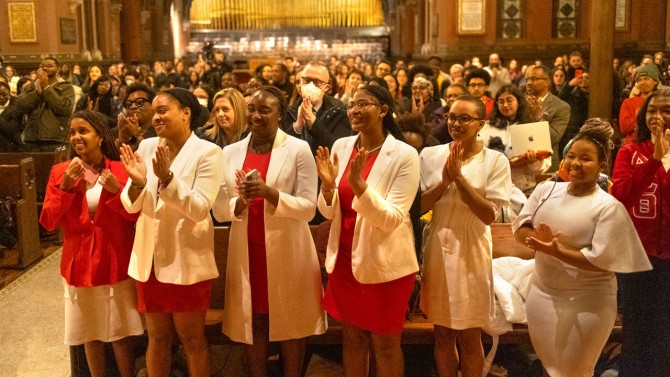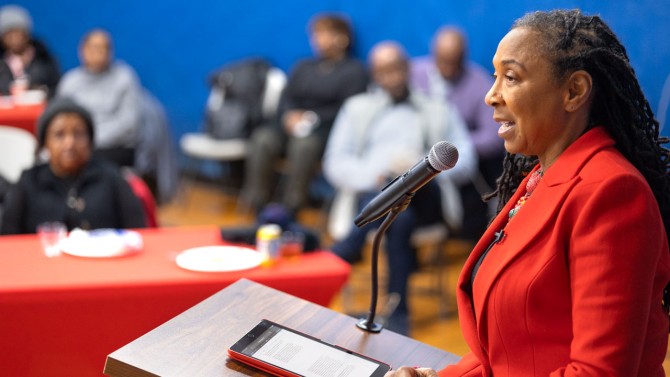
Kimberlé Crenshaw, a professor of law at the University of California, Los Angeles School of Law and at Columbia Law School, delivers the 2024 Martin Luther King Jr. Commemorative Lecture in Sage Chapel.
MLK lecture: Encourage democracy, fight suppression
By Laura Gallup
After watching her parents cry at the television news report of Martin Luther King Jr.’s assassination on April 4, 1968, Kimberlé Crenshaw ’81 attended a memorial service where she – a third grade girl – was moved to speak. She encouraged those around her to keep fighting for King’s dream and pick up where he left off.
“I cannot say what forced me to my feet that day at Jerusalem Baptist Church,” said Crenshaw, a pioneering scholar and writer on civil rights and critical race theory, who spoke at the 2024 Martin Luther King Jr. Commemorative Lecture held in Sage Chapel on Feb 19.
“What I can tell you,” she said, “is that the refusal to yield to the forces that sought to silence Dr. King entered into my consciousness and never left.”
Titled “The Urgency of Intersectional Justice,” this year’s lecture drew 400 in-person attendees and more than 840 virtual registrants from Cornell and the surrounding community. Crenshaw, a professor of law at the University of California, Los Angeles School of Law and at Columbia Law School, read excerpts from her memoir, a work-in-progress titled “Notes from a Backtalker,” and reflected on the ways King’s influence shaped her personal, academic and professional journey.
“Dr. King’s invitation to rise up for a better tomorrow inspired me throughout my adolescence,” Crenshaw said. “In fact, it was a large part of what brought me here to Cornell, where my education, both formal and informal, shaped the thinking that led me to critical race theory and, in turn, to intersectionality.”
During her remarks, Crenshaw noted the significance of returning to Cornell and standing in the same spot where King spoke about nonviolent resistance during his own visit to Sage Chapel in 1960.
She also spoke about other early influences, including the late James Turner, founding director of Cornell’s Africana Studies and Research Center in the College of Arts and Sciences and a pioneer of the multidisciplinary approach to exploring the African diaspora. Crenshaw recalled a first-semester course she took with Turner, who became “the guide that opened the door to the rich and rewarding exploration of the Black experience in the Americas.”
“I had never been in a class that began by pressing us to think about the journey we were beginning in relation to the here-and-now-lives that we were actually living,” Crenshaw said.
In the Africana Library, Crenshaw came across the work of Harvard University professor Derrick Bell, whose book, ”Race, Racism, and American Law,” inspired Crenshaw to attend Harvard in pursuit of a law degree.
Crenshaw later discussed her work in critical race theory (CRT) and intersectionality, and lamented current attacks on higher education, specifically citing anti-CRT legislation and recent efforts to ban books. But Crenshaw also urged the audience not to give up, citing King’s perseverance in the face of backlash, violence, harassment and censorship.
“My overarching hope is that by the end of our journey, you take away the tools and language necessary to connect the dots between the continuing scourge of racism and related forms of injustice, and why we must understand that the fight to preserve our democracy and the fight against suppression are one and the same,” Crenshaw said. “We cannot win one without the other.”
The annual lecture was one of three events Crenshaw participated in as part of Cornell’s annual Martin Luther King Jr. Commemoration, a cross-campus and community partnership that makes accessible the life and legacy of King for contemporary times. The Greater Ithaca Activities Center in Ithaca hosted a luncheon where Crenshaw engaged with local community leaders around the dangers of banning books, and Cornell Law School held a fireside chat where Crenshaw talked with India Thusi, visiting professor of law, and Gautam Hans, associate clinical professor of law, around the legal history behind CRT and intersectionality, and the role of law in advancing social justice and civil rights.
The 2024 Commemoration is part of the yearlong celebration of the 50th anniversary of the Women’s Resource Center at Cornell, newly renamed the Gender Equity Resource Center (GenEq), and celebrates Crenshaw’s lifelong efforts as a leading advocate, educator and pioneer for gender justice. The Commemoration also highlights the intersectional work of the newly renamed Centers for Student Equity, Empowerment, and Belonging within the Office of the Dean of Students.
Laura Gallup is a communications lead in Student and Campus Life.
Media Contact
Get Cornell news delivered right to your inbox.
Subscribe


